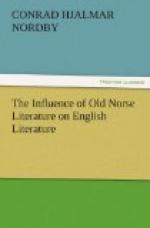Temple certainly had no knowledge of Old Norse, and yet, in 1679, he could write so of a poem which he had to read through the Latin. Sir William had a wide knowledge and a fine appreciation of literature, and an enthusiasm for its dissemination. He takes evident delight in telling the fact that princes and kings of the olden time did high honor to bards. He regrets that classic culture was snuffed out by a barbarous people, but he rejoices that a new kind came to take its place. “Some of it wanted not the true spirit of poetry in some degree, or that natural inspiration which has been said to arise from some spark of poetical fire wherewith particular men are born; and such as it was, it served the turn, not only to please, but even to charm, the ignorant and barbarous vulgar, where it was in use."[8]
It is proverbial that music hath charms to soothe the savage breast. That savage music charms cultivated minds is not proverbial, but it is nevertheless true. Here is Sir William Temple, scion of a cultured race, bearing witness to the fact, and here is Gray, a life-long dweller in a staid English university, endorsing it a half century later. As has been intimated, this was unusual in the time in which they lived, when, in Lowell’s phrase, the “blight of propriety” was on all poetry. But it was only the rude and savage in an unfamiliar literature that could give pause in the age of Pope. The milder aspects of Old Norse song and saga must await the stronger century to give them favor. “Behold, there was a swarm of bees and honey in the carcass of the lion.”
GEORGE HICKES (1642-1715).
The next book in the list that contains an English contribution to the knowledge of our subject is the Thesaurus of George Hickes. On p. 193 of Part I, there is a prose translation of “The Awakening of Angantyr,” from the Harvarar Saga. Acknowledgment is given to Verelius for the text of the poem, but Hickes seems to have chosen this poem as the gem of the Saga. The translation is another proof of an antiquarian’s taste and judgment, and the reader does not wonder that it soon found a wider audience through another publication. It was reprinted in the books of 1716 and 1770 in the above list. An extract or two will show that the vigor of the old poem has not been altogether lost in the translation:
Hervor.—Awake Angantyr, Hervor the only daughter of thee and Suafu doth awaken thee. Give me out of the tombe, the hardned[9] sword, which the dwarfs made for Suafurlama. Hervardur, Hiorvardur, Hrani, and Angantyr, with helmet, and coat of mail, and a sharp sword, with sheild and accoutrements, and bloody spear, I wake you all, under the roots of trees. Are the sons of Andgrym, who delighted in mischief, now become dust and ashes, can none of Eyvors sons now speak with me out of the habitations of the dead! Harvardur, Hiorvardur! so may you all be within your ribs, as a thing that is hanged up to putrifie among insects, unlesse you deliver me the sword which the dwarfs made ... and the glorious belt.




